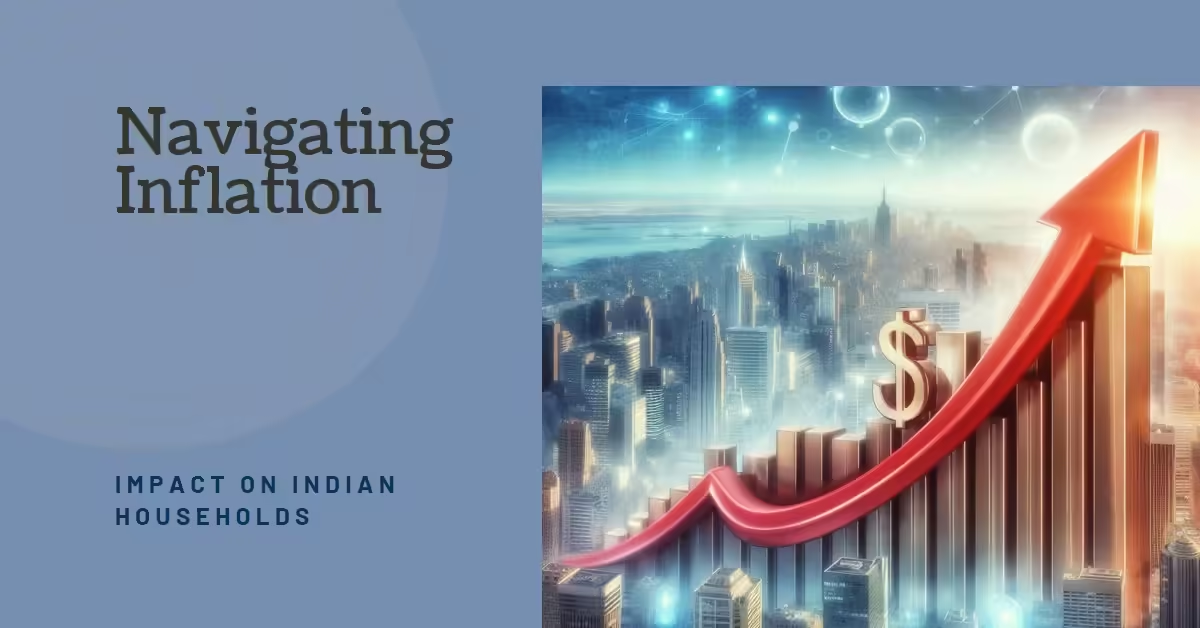Inflation has been on a steady incline in India over the past couple of years, affecting households across income brackets. The surge in prices of essentials like food, utilities, and fuel has forced families to reassess their budgets and spending habits. This article delves into the specifics of how inflation in 2023-2024 is impacting Indian households and offers insights from economists on what families can do to manage their finances effectively.
Understanding Inflation: A Brief Overview
Inflation represents the rate at which the general level of prices for goods and services rises, eroding purchasing power. In 2023, inflation in India has been driven by global supply chain disruptions, geopolitical tensions, and fluctuating oil prices, which have led to higher import costs and elevated prices for essential goods and services.
For more insights into the factors driving inflation and economic policies in India, visit our article on Inflation Trends and Predictions at epicinfinite.com.
1. Impact on Food Prices
One of the most immediate effects of inflation in India has been felt in the prices of food. Essential food items, such as vegetables, dairy products, and cooking oils, have seen significant price hikes, impacting household budgets profoundly. According to recent data from the Consumer Price Index (CPI), food inflation has hovered around 7-8%, with certain categories experiencing even higher spikes.
Key Factors Driving Food Inflation:
- Supply Chain Issues: From transportation costs to import taxes, disruptions in global supply chains have made food imports more expensive.
- Weather Variability: Erratic monsoon patterns have affected agricultural output, particularly in staple grains, leading to reduced supply and higher prices.
- Global Demand: Increased demand from global markets has also driven up the prices of commodities like pulses and edible oils.
To learn more about managing household budgets in light of rising food costs, check out our guide on Household Budgeting Tips for Inflationary Times.
2. Rising Utility Bills
Utilities, which include electricity, water, and gas, have also seen a notable price increase. For many families, electricity and cooking gas make up a substantial part of their monthly expenses. The recent hikes in electricity tariffs and LPG prices have compounded the financial pressure on households.
According to industry experts, the rising cost of fuel for power generation, coupled with the increased demand for electricity, has led to higher bills for consumers. While the government has introduced some subsidies to soften the blow, the overall trend of rising costs remains a burden for many.
3. Fuel Prices: A Major Contributor
Fuel prices are often a key driver of inflation in India. Given that India imports a significant portion of its oil, any fluctuation in global oil prices has a direct impact on domestic fuel costs. With the increase in crude oil prices over the past year, consumers have faced higher prices for petrol, diesel, and cooking gas.
The high cost of fuel affects not only transportation but also the pricing of goods and services. As transportation costs increase, so do the prices of essential goods, which are then passed on to consumers. In a country as vast as India, where transport infrastructure plays a vital role in supplying goods across cities and rural areas, fuel price inflation can lead to a cascade effect on household budgets.
4. Inflation’s Effect on Education and Healthcare Costs
Education and healthcare, while not immediate necessities for every household, represent significant expenses for families with school-going children or elderly members. With the current inflationary environment, educational costs, including tuition fees, school supplies, and technology for online learning, have seen an uptick. Healthcare expenses, from medications to routine checkups, are also rising, which has made it difficult for households to allocate enough funds for quality services.
Strategies for Managing Household Budgets Amid Inflation
Economists suggest several strategies that can help families adapt their spending habits and navigate the challenges of inflation.
1. Reevaluate Monthly Expenses
- Identify non-essential expenses that can be reduced or postponed.
- Use budgeting tools or apps to track spending and make informed adjustments.
2. Consider Bulk Purchases for Essentials
- Buying in bulk for items like grains, pulses, and non-perishable goods can lock in prices and offer some insulation against future price hikes.
3. Look for Discounts and Offers
- Many retailers and online platforms offer discounts, loyalty programs, or cashback offers on essential items.
4. Energy-Saving Practices
- Implement energy-efficient practices, such as using LED lights or reducing unnecessary appliance use, to reduce electricity bills.
5. Invest in Inflation-Protected Securities
- Consider exploring inflation-linked savings bonds or investment products that can provide better returns in high-inflation environments.
For more detailed advice on managing inflation, see our expert-backed article on Investment Tips for Inflation Protection.
What Lies Ahead: Expert Insights on Inflation Control
Many economists remain hopeful that with proactive measures by the Reserve Bank of India (RBI), inflation could be brought under control. Interest rate hikes, stricter monetary policies, and fiscal measures are already in place to stabilize prices.
However, external factors like global economic conditions and geopolitical events may continue to influence inflation trends in India. Readers can stay updated on these topics with our ongoing analysis on Economic Outlook and Inflation Control.
Conclusion
The rising inflation of 2023-2024 has made a notable impact on household budgets across India, influencing the prices of essentials such as food, utilities, and fuel. While inflationary pressures can be challenging, strategic budgeting, cost-cutting practices, and smart investments can help households manage expenses effectively. By understanding the causes and effects of inflation, families can make better-informed financial decisions and reduce the strain on their budgets.
For more in-depth coverage on inflation trends and budget management, explore our articles at Epic Infinite’s Financial Insights.
References and Further Reading
- Reserve Bank of India – Inflation Control Measures
- Ministry of Finance, India – Economic Policies and Updates
This article provides both an economist’s perspective and actionable advice, catering to professionals and household readers seeking to better understand and adapt to inflation’s impact.
Inflation Forecast for 2023-2024: What Indian Consumers Need to Know

Inflation remains one of the most closely watched economic indicators in India, affecting everything from household budgets to corporate profits. With inflationary pressures projected to persist in 2023-2024, understanding how inflation might evolve and its likely impact on consumer prices is crucial. This article explores the current inflation outlook in India, predictions for the near future, and practical advice on how Indian consumers can prepare.
Current State of Inflation in India
As of late 2023, inflation in India has seen fluctuations due to a combination of global and domestic factors. Recent data from the Reserve Bank of India (RBI) and the Ministry of Finance indicate that inflation has been driven by several key factors:
- Global Commodity Prices: The continued volatility in global oil prices, driven by geopolitical tensions, has led to higher costs for imported fuel.
- Food Prices: Irregular monsoon patterns and climate-related disruptions have impacted agricultural production, leading to higher food prices.
- Supply Chain Disruptions: Ongoing supply chain constraints, especially in essential commodities, have pushed up transportation and logistics costs.
Given these pressures, the average Consumer Price Index (CPI) inflation rate for 2023 has hovered around 6%, higher than the RBI’s target of 4%.
Inflation Forecast for 2023-2024
The forecast for inflation in India over the next year remains mixed. Economists predict that inflation may moderate slightly by mid-2024 but is unlikely to return to pre-pandemic levels in the near term. Here’s a closer look at the factors that may shape inflation in 2024:
- RBI’s Monetary Policy Interventions: The RBI is expected to continue with periodic interest rate hikes to control inflation. This approach, aimed at curbing consumer spending, could lower demand and help moderate prices by mid-2024.
- Food Inflation Outlook: Food inflation is expected to ease in early 2024 if agricultural output stabilizes with a favorable monsoon season. However, global trends in food prices and demand for exports will likely remain influential.
- Fuel and Energy Costs: Crude oil prices are projected to stay volatile, with no immediate resolution to geopolitical issues affecting oil-producing regions. Consequently, fuel prices in India might continue to fluctuate, directly impacting transportation and production costs across various sectors.
- Impact of the Global Economy: Slower growth in major economies like the United States and Europe could reduce demand for Indian exports, affecting economic growth and potentially cooling inflation pressures domestically.
For more insights on factors impacting India’s economy, visit Economic Outlook for 2024.
What These Predictions Mean for Consumer Prices in India
The inflation forecast for 2023-2024 suggests continued price increases across essential goods and services. Here’s what consumers can expect in specific categories:
1. Food and Beverage Prices
- Prices of staple goods like grains, vegetables, and dairy products are likely to see moderate increases. Seasonal variations will continue to play a role, and any adverse weather events could lead to sudden spikes.
- Imported food products, particularly oils and pulses, will remain more expensive as a result of high international prices and currency fluctuations.
2. Utilities and Energy
- Electricity tariffs and LPG prices may remain elevated due to the high cost of imported fuel and increased domestic demand. Consumers may face periodic hikes in utility bills, adding to household expenses.
- For households using LPG for cooking, subsidies may soften the impact, but the overall trend points to higher out-of-pocket costs.
3. Housing and Rent
- With rising interest rates, the cost of home loans is expected to remain high, impacting homebuyers. Rent prices may also increase, particularly in urban areas, as housing demand remains strong.
4. Transportation and Fuel
- Fuel prices, including petrol and diesel, are expected to remain volatile. This will affect both personal transportation costs and the price of goods that rely on logistics and supply chains.
- Public transportation costs could see adjustments as fuel expenses continue to be passed on to consumers.
5. Healthcare and Education
- Healthcare costs may see a steady increase, particularly for imported medicines and medical equipment. Consumers should be prepared for rising expenses in these areas.
- Educational costs, including tuition fees, are also expected to rise, as institutions adjust their pricing to meet higher operational costs.
Practical Tips for Consumers to Manage Inflation
To help manage the rising costs associated with inflation, economists recommend a few strategies that can aid consumers in protecting their financial health:
- Optimize Household Budgets: Review monthly expenses and identify discretionary costs that can be reduced or eliminated. Allocating more budget toward essentials can help mitigate the impact of rising prices.
- Invest in Inflation-Resilient Assets: Consider diversifying investments to include assets that tend to perform well during inflationary periods, such as real estate, commodities, and inflation-linked bonds.
- Bulk Purchase of Essentials: For items with longer shelf lives, buying in bulk can help secure today’s prices and provide a buffer against future increases.
- Energy Efficiency: Implement energy-saving practices in the household to reduce electricity and fuel bills, which will likely remain high in the coming year.
- Stay Informed: Regularly monitor economic news and policy updates. Following the RBI’s announcements on monetary policy and changes in government subsidies can provide insights into expected price movements.
For more in-depth budgeting tips, see our guide on Managing Finances in an Inflationary Economy.
The Road Ahead: Can Inflation Be Controlled?
The government and the RBI are committed to achieving inflation control through a combination of monetary and fiscal measures. While it may take time for these measures to show effects, the outlook for the latter half of 2024 holds some promise for reduced inflation, contingent upon stable global economic conditions and improved domestic production.
For a deeper look into how these policies might affect long-term economic stability, explore our analysis on India’s Inflation Control Policies.
Conclusion
As we move through 2023 and into 2024, inflation will continue to be a challenge for Indian consumers. By understanding the factors driving inflation and preparing for potential cost increases, households can better manage their budgets and financial health. Consumers can stay ahead of inflation’s impact by following economic updates, investing wisely, and adopting practical strategies to offset rising prices.
For the latest updates on economic trends and financial advice, visit Epic Infinite’s Economic Insights.
References and Further Reading:
- Reserve Bank of India – Monetary Policy Statements
- Ministry of Finance, India – Economic Updates and Budget Highlights
This comprehensive look at inflation forecasts equips both economists and general readers with valuable insights into what they can expect and how they can respond to inflationary pressures in the coming year.
5 Practical Ways to Manage Your Finances During High Inflation

Inflation can challenge both individuals and small businesses, squeezing budgets and making it harder to maintain financial stability. Rising prices mean that the value of money declines, so adopting smart financial strategies can help soften the impact. Here are five effective approaches for individuals and small businesses to manage finances during inflationary times.
1. Reevaluate and Prioritize Your Budget
Inflation affects nearly every spending category, so reexamining and prioritizing expenses can help individuals and small businesses stay financially resilient.
- For Individuals: Start by categorizing expenses into essentials (like food, rent, and utilities) and non-essentials (entertainment, dining out). Consider cutting back on discretionary spending temporarily. Using budgeting tools and apps can help track and manage monthly spending.
- For Small Businesses: Identify essential operating costs, such as raw materials and utilities, and seek ways to reduce non-critical expenses. Reviewing your budget regularly and adjusting it to inflation rates can help keep your finances under control.
Pro Tip: Automate savings by setting aside a fixed percentage of income each month to ensure consistent savings, even as expenses rise.
2. Consider Inflation-Protected Investments
Investing in inflation-resistant assets can help your finances grow or at least maintain value despite inflation.
- For Individuals: Inflation-linked bonds, such as the Government of India’s Inflation-Indexed Bonds, are designed to keep pace with inflation and offer a secure way to protect your savings. Other options include real assets like real estate, which tend to appreciate over time.
- For Small Businesses: Businesses can invest in fixed assets or diversify funds into commodities and raw materials with appreciating value. Additionally, diversifying investments in accounts that yield above-inflation returns can protect funds against eroding purchasing power.
For more on investment options, check out our Guide to Inflation-Proof Investing.
3. Bulk Purchase Essentials and Raw Materials
Bulk purchasing can be a smart way to save on costs by locking in current prices and preparing for further increases.
- For Individuals: Buy non-perishable household essentials like grains, cooking oil, and toiletries in bulk. This allows you to avoid incremental price hikes on frequently used items.
- For Small Businesses: Stocking up on essential inventory or raw materials can help avoid future price hikes. Building partnerships with suppliers may also allow for discounts or bulk purchase benefits, which can be a great advantage when prices are rising.
Pro Tip: Look for bulk-buying offers and wholesale deals to maximize savings.
4. Implement Energy-Saving Practices
Energy prices often increase during inflation, so reducing energy use can be a significant way to cut costs.
- For Individuals: Implement energy-efficient practices at home, such as using LED lighting, energy-saving appliances, and smart thermostats to reduce electricity bills.
- For Small Businesses: Upgrading to energy-efficient equipment or machinery can help reduce operational costs. Conducting an energy audit to identify cost-saving areas, such as switching to low-energy lighting or optimizing HVAC systems, can also save money over time.
For more tips on energy conservation, explore our article on Energy-Efficient Practices for Households and Businesses.
5. Create an Emergency Fund
An emergency fund is essential during uncertain financial periods. It can help cover unexpected costs, prevent debt accumulation, and offer peace of mind.
- For Individuals: Set aside 3-6 months’ worth of living expenses in a liquid savings account to prepare for any unexpected financial need or job loss.
- For Small Businesses: Aim to have an emergency reserve that covers 3-6 months of operating expenses, such as payroll, rent, and utilities. Having a buffer can help you navigate through tough times without compromising the business.
Pro Tip: Regularly review and adjust your emergency fund to account for inflation, especially if living or operating costs rise significantly.
Conclusion
By adopting these five strategies, individuals and small businesses can mitigate the impact of inflation and maintain financial resilience. Prioritizing expenses, investing in inflation-protected assets, bulk buying, saving on energy, and building an emergency fund are actionable steps that can make a meaningful difference.
For more financial insights and updates, visit our Finance and Budgeting Hub on Epic Infinite.
FAQ
1. What is inflation, and how does it affect household budgets?
Inflation is the rate at which the prices of goods and services increase over time, reducing purchasing power. For households, this means higher costs for essentials like food, housing, and utilities, making budgeting more challenging.
2. What are some effective budgeting tips for inflationary periods?
Prioritize essential expenses, reduce discretionary spending, and consider bulk-buying non-perishables to lock in current prices. Using budgeting apps can also help track and manage spending effectively.
3. How can individuals protect their savings from inflation?
Invest in inflation-protected assets like government inflation-linked bonds, real estate, or commodities. These assets often maintain or grow in value as prices rise, preserving your purchasing power.
4. How does inflation impact small businesses?
Small businesses may face higher costs for materials, utilities, and wages during inflation. Adjusting prices, reducing non-essential expenses, and investing in energy-efficient practices can help manage these pressures.
5. What types of investments are resilient against inflation?
Investments like real estate, commodities (e.g., gold), and inflation-indexed bonds can help maintain value during inflation. Diversifying your portfolio with these assets may protect against rising prices.
6. How can I save on energy costs as prices increase due to inflation?
For households, consider energy-efficient appliances, LED lighting, and reducing heating or cooling usage. Small businesses may benefit from energy audits and equipment upgrades to reduce electricity bills.
7. Why is it important to have an emergency fund during inflation?
An emergency fund acts as a financial cushion, covering unexpected expenses and helping to avoid debt. During inflation, having this buffer is especially useful since the cost of essentials and emergencies may increase.
8. Will inflation rates stabilize soon?
Inflation forecasts vary, but experts suggest gradual stabilization may occur by late 2024, depending on economic policies and global factors like commodity prices and supply chain recovery.
9. How does inflation affect the cost of consumer goods?
Inflation typically raises the prices of essential goods, such as food, fuel, and household items. Consumers may notice more frequent price adjustments as businesses account for rising supply costs.
10. What government resources can I refer to for inflation updates?
You can find reliable updates on inflation trends from the Reserve Bank of India, the Ministry of Finance, and official economic reports, which often publish data and forecasts on consumer prices and inflation rates.
Including these FAQs will provide readers with additional clarity on inflation’s impact, actionable steps, and resources for financial planning during inflationary times.










